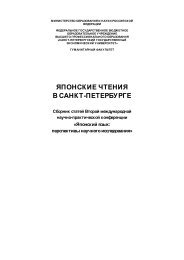to Learners with Special Educational Needs
e-textbook SEN
e-textbook SEN
You also want an ePaper? Increase the reach of your titles
YUMPU automatically turns print PDFs into web optimized ePapers that Google loves.
Pokrivčáková, S. et al. (2015). Teaching Foreign Languages <strong>to</strong> <strong>Learners</strong> <strong>with</strong> <strong>Special</strong> <strong>Educational</strong> <strong>Needs</strong>:<br />
e-textbook for foreign language teachers. Nitra: Constantine the Philosopher University. 128 p.<br />
ISBN 978-80-558-0941-0<br />
13. It embarrasses me <strong>to</strong> volunteer answers in my language class.<br />
14. I would not be nervous speaking the foreign language <strong>with</strong> the native speakers.<br />
15. I get upset when I don´t understand what the teacher is correcting.<br />
16. Even if I am prepared for language class, I feel anxious about it.<br />
17. I often feel like not going <strong>to</strong> my language class.<br />
18. I feel confident when I speak in foreign language class.<br />
19. I am afraid that my language teacher is ready <strong>to</strong> correct every mistake I make.<br />
20. I can feel my heart pounding when I´m going <strong>to</strong> be called on in language class.<br />
21. The more I study for a language test, the more confused I get.<br />
22. I don´t feel pressure <strong>to</strong> prepare very well for language class.<br />
23. I always feel that the other students speak the foreign language better than I do.<br />
24. I feel very self-conscious about speaking the foreign language in front of other students.<br />
25. Language class moves so quickly I worry about getting left behind.<br />
26. I feel more tense and nervous in my language class than in my other classes.<br />
27. I get nervous and confused when I am speaking in my language class.<br />
28. When I´m on my way <strong>to</strong> language class, I feel very sure and relaxed.<br />
29. I get nervous when I don´t understand every word the language teacher says.<br />
30. I feel overwhelmed by the number of rules you have <strong>to</strong> learn <strong>to</strong> speak a foreign language.<br />
31. I am afraid that other students will laugh at me when I speak the foreign language.<br />
32. I would probably feel comfortable around native speakers of the foreign language.<br />
33. I get nervous when the language teacher asks questions which I haven´t prepared in<br />
advance.<br />
5-point<br />
Likert Scale<br />
Strongly<br />
agree<br />
Agree<br />
Neither agree<br />
nor disagree<br />
Disagree<br />
Strongly<br />
disagree<br />
The table serves as an example for teachers <strong>to</strong> get inspired and may later alert it according <strong>to</strong><br />
their needs.<br />
The universal scale by Horwitz et al. (1986), which was used by students learning Spanish as<br />
a second language, has been later adjusted by other researchers according <strong>to</strong> the language or a<br />
cultural background where the research has been conducted. As FLA has been studied mostly in<br />
classrooms learning English as a second language, “English Learning Anxiety Scale” (ELAS) has<br />
been created. Firstly, the majority of research has been conducted in Western countries. Later<br />
on, more and more research results have been coming from Asian countries using modified scale<br />
version called “Second Language Speaking Anxiety Scale”. Moreover, in Saudi Arabia, the “Arabic<br />
Foreign Language Anxiety Questionnaire” (AFLAQ) has been developed.<br />
In Woodrow´s research (2006) it is stated that English language learners from countries such<br />
as China, Korea and Japan were more anxious than other ethnic groups. Further, Al-Saraj (2011)<br />
explains why Saudi Arabian culture creates a social and cultural setting for examining FLA. The<br />
education system in Saudi Arabia is free for all levels, where male and female students are<br />
separated, typically attending segregated schools. The combination of fac<strong>to</strong>rs such as the<br />
importance of learning English, the educational system and conservative culture create an<br />
environment for FLA. Moreover, the study where only females were participating showed, that<br />
giving live, in-class presentations causes strong anxiety for them.<br />
Moreover, Horwitz (1996) using the Teacher Foreign Language Anxiety Scale (TFLAS), was<br />
the first researcher <strong>to</strong> propose that non-native teachers and student teachers may experience<br />
feelings of FLA as well. However, the research on FL teachers and student teachers´ feelings of<br />
anxiety remains very limited <strong>to</strong> this day. Nevertheless, this kind of FLA can have a number of<br />
undesirable effects on FL education (Horwitz, 1996). As the number of non-native FL teachers<br />
increases by the year, it is clear that more research is desperately needed in this area.<br />
95






